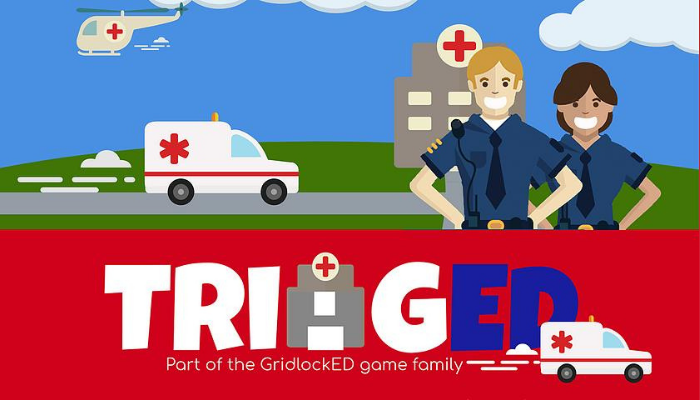New disaster training game is a game-changer

Original article posted by McMaster University’s Faculty of Health Sciences
Teresa Chan, co-founder of TriagED, is a member of the MGDII College of Health Inventors
A McMaster University-designed game to test health-care learners’ responses to mass casualty events has won the GALA 2021 Serious Game Conference Award.
TriagED won GALA 2021’s academic game category and will be showcased at their virtual conference on Dec. 1-2.
Aimed primarily at healthcare learners specializing in emergency care, TriagED puts players in the position of paramedics on the scene of a crisis. Using playing cards, they must triage patients, distribute them evenly to local hospitals to avoid backlogs and ensure the smooth running of ambulances.
TriagED is a prequel to GridlockED, another McMaster-designed game launched in 2018 that sees players playing the role of health-care workers managing a hospital inundated by emergency cases.
“This is a major win for our entire development team. TriagED is a chance to showcase a new kind of education that helps people learn lifesaving information in a different and engaging way, so they are prepared for when the stuff hits the fan,” said Teresa Chan, associate dean of Continuing Professional Development at McMaster’s Faculty of Health Sciences.
“The proceeds from both this game and its counterpart GridlockED will be directed into a fund that we have set up to fuel further research and innovation in the field of serious gaming.”
Naman Arora, a third-year medical student at McMaster, said TriagED forces learners to master split-second decision making and sound judgment during emergencies, in a way that cannot be taught by lectures or traditional disaster tabletop exercises.
Having played the game since early 2020, Arora said he enjoyed seeing his triaging decision-making improve after just one play-through.
“Mass casualty events are an interesting and, thankfully, a rare topic in emergency medicine. Hopefully I won’t be exposed to this in my residency, but if such an event does happen, I must be prepared as a physician to handle the crisis,” said Arora, who plans on becoming an emergency room doctor and is writing a research paper on TriagED.
“Serious games like TriagED will definitely have a role to play in medical education moving forward. Education formats are always changing and if we can find ways to keep learners engaged through such games, it is a way for health sciences education to continue evolving.”
Clare Wallner, an emergency physician at Hamilton Health Sciences, said such education is already saving lives, pointing to a disaster management specialist and off-duty military and police members’ efforts to rescue people during the 2017 Las Vegas shooting.
Wallner said mass casualty events such as shooting rampages, terror attacks, or natural disasters such as earthquakes are what medical professionals call high acuity, low occurrence (HALO) situations.
She said the key to effective patient triaging in HALO scenarios is quickly deciding who needs immediate intervention and can survive versus those with non-survivable injuries; and determining those less seriously injured who can wait for treatment.
“HALO scenarios are exactly what we gear our training towards,” said Wallner, an associate professor of McMaster’s emergency medicine division who co-created the game with Chan.
“People can literally play TriagED every day for a month, become really good at triaging and hardwire the decision-making skills into their brains for a real emergency.”
However, both Chan and Wallner see TriagED as one cog in an entire health-care machine set up to handle mass casualty emergencies.
This means having available space in emergency rooms and sufficient ambulances to transport patients, which has not always been the case during the COVID-19 pandemic.
Since early 2020, hospitals have been inundated with COVID-19 patients, who often take days or weeks to recover, often delaying care for people with other conditions. Chan said this has forced hospitals to adapt on the fly, relying on outpatient and follow-up clinic care, while implementing safety protocols to stop COVID-19’s spread.
“Especially with COVID-19, emergency care has changed so much that I don’t think a simple game will help us all, but it might open conversations that we need to have about reforming our system moving forward from the pandemic,” said Chan.
“That will be the true game-changer for our healthcare system.”
Helping Chan and Wallner develop TriagED were co-collaborators Paula Sneath, Kevin Morgan, J. Bruce Blain, Reva Qiu and Sasha Palmert.
Both Chan and Wallner said anyone wishing to buy the game for Christmas should do so fast, as orders are already piling up.
TriagED is available for purchase at https://www.gridlockedgame.com/triaged-game. Each game pack costs $39.99 plus shipping.
For more information on GALA 2021, please visit https://conf.seriousgamessociety.org/competition/.
Education & Innovation, News